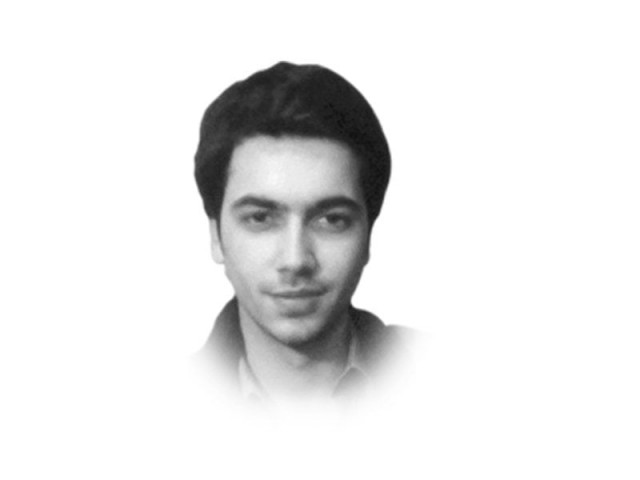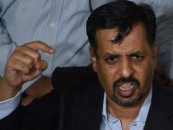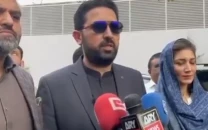Zarb-e-Azb, Year One
Zarb-e-Azb is, as of this moment, accomplishing what it set out to do: making Pakistan a safer place

The writer is a barrister and columnist. He tweets
@AsadRahim
It was 18 words, so different from what we’d been hearing. Different from the civilians who couldn’t take the Taliban’s name. Different from the cut-and-dry of ISPR tweets, calling for glory. Words that told us something of this war, and the terrible price we paid.
General Raheel Sharif said them in November of last year; a visual in a long line of visuals that scarred the country.
Because these past 11 years, Pakistan changed forever. Before our eyes, in fact: Sufi Muhammad arching his arms, addressing thousands in Swat. His son-in-law, the man that would mass-murder our children, teaching us pious living on the radio.

It numbed us to principle: we saw the death of the Left — President Zardari, bowing and scraping before the mindset that widowed him; Chief Minister Hoti saying the Swat deal (black flags raised on sovereign land) was ‘reached after the realisation that it was the demand of the people.’ ‘People’ other than the PPP and ANP men hunted down and killed in the aftermath.
It numbed us to reason: after wresting Swat away, the Left was bombed out, and the Right was elected in — but the state still wanted to talk. The Taliban returned the PML-N’s goodwill, by razing our courts and storming our airport.
It numbed us to poison: we heard the words of Munawar Hasan, who said those that fell in this war weren’t Shaheed. We heard Subedar Sahib Khan’s reply — that his son Lieutenant Faiz took 22 bullets in the chest fighting the Taliban in the Mohmand Agency. Mr Khan said he didn’t shed a tear when he buried his martyred son. Since Munawar Hasan’s statement, he said, he had wept for two days.
And we wept on December 16, 2014, when children were murdered under their desks. This was third-generation Pakistan as we were witnessing it: barbarians playing football; the Taliban executing schoolchildren; Munawar and Abdul Aziz mocking the fallen.
But we had clarity. Whatever the situation in 2004, 2014 meant this was our war, the fight for the soul of this country — something the previous military dispensation never recognised. General Sharif did.
This Monday will mark a year since Operation Zarb-e-Azb began. And Zarb-e-Azb — meaning the strike of the sword the Holy Prophet (PBUH) used in Badr and Uhud — is not yet over.
But it has made tremendous strides. The heart of the cancer in North Waziristan is being pounded, and what was long a hub for the world’s worst militants is being flushed out. Attitudes, too, have opened up: the Haqqanis are no longer the elephant in the room; a two-pronged squeeze is no longer a dream in the distance; and Kabul is seen as part of the solution instead of the problem.
And the world is noticing: air strikes combined with a massive ground offensive in Waziristan tend to spell seriousness, and are a rare occurrence besides — instances where pure airpower made zero difference to well-embedded militias abound. See Yemen. See ISIS. See drone stats.
To use data from the South Asia Terrorism Portal, civilian casualties from terrorist violence are in decline: dropping 40 per cent in 2014 — the year the operation was launched — to 65 per cent in 2015, if trends hold steady. That means the lowest number of civilian deaths, horrifically high regardless, since 2007.
Not least, fatalities from suicide attacks (the sort of stats we pray disappear forever) are less than a tenth of what they were in 2013, though half the year’s left. Even polio cases have shrunk owing to greater access to the tribal areas, and vaccinating citizens previously under the thumb of cavemen. Optimism is returning, if inch by inch.
And now’s not the time to get distracted. Netaji Modi may be pounding his chest into a tizzy, invading Burma and making rhino sounds. But this isn’t the ‘60s: the enemy is among us, and of us. Whether the said enemy accepts Mumbai legal tender is a second-string issue — that militants are operating on our soil is cause enough.
In any event, Zarb-e-Azb is, as of this moment, accomplishing what it set out to do: making Pakistan a safer place. That doesn’t mean we celebrate: military operations aren’t a pretty business. Operations mean surgery; until Fata is thought a part of Pakistan, until it is developed and rehabilitated, the north of our country will remain an open wound. Returning IDPs must be supported by the state every step of the way (Fazlullah’s TNSM made a comeback, in part, by assisting earthquake affectees in 2005).
Then there’re the side effects. To paraphrase a German poet (badly) — battle not with monsters, lest you become one. Pakistan may be getting better at fighting the dark side; that doesn’t mean it lose itself to it. Consider: the state is executing people faster than Saudi Arabia, meaning it’s now the most prolific executioner in the world. Military courts are still on the books, a cruel stopgap for a justice system that required reforming years ago. Balochistan is falling into the abyss; the Baloch remain abused and underreported, and separatists continue massacring non-Baloch settlers.
Finally, it’s time to put Zarb-e-Azb into context: as a hammer to beat the bad guys with, rather than curing what creates them. An offensive that must be part of a far larger civilian and military project: killing an extremism that is far wider spread.
The kind miles away from Waziri mountains: in urban centres and mosque microphones, in extortion rackets and foreign accounts, in Jhang and Joseph Colony and Karachi and Shikarpur. Sectarian parties — banned and banned again — are running loose, at times in open collaboration with Islamabad. Crazies like Abdul Aziz are afforded airtime by our media channels. Our educated classes — raised on a diet of Ghoris and Ghaznavis — sneer at both of our Nobel Laureates.
But, if January 7, 2014, teaches us anything, it’s that the light isn’t far. On that morning, Aitzaz Hasan threw himself at a suicide bomber, and saved his school. And he showed us what the essence of this war was.
Because with Aitzaz comes clarity: everything that is wrong with Pakistan can be fought with everything that is right.
Published in The Express Tribune, June 12th, 2015.
Like Opinion & Editorial on Facebook, follow @ETOpEd on Twitter to receive all updates on all our daily pieces.















COMMENTS
Comments are moderated and generally will be posted if they are on-topic and not abusive.
For more information, please see our Comments FAQ